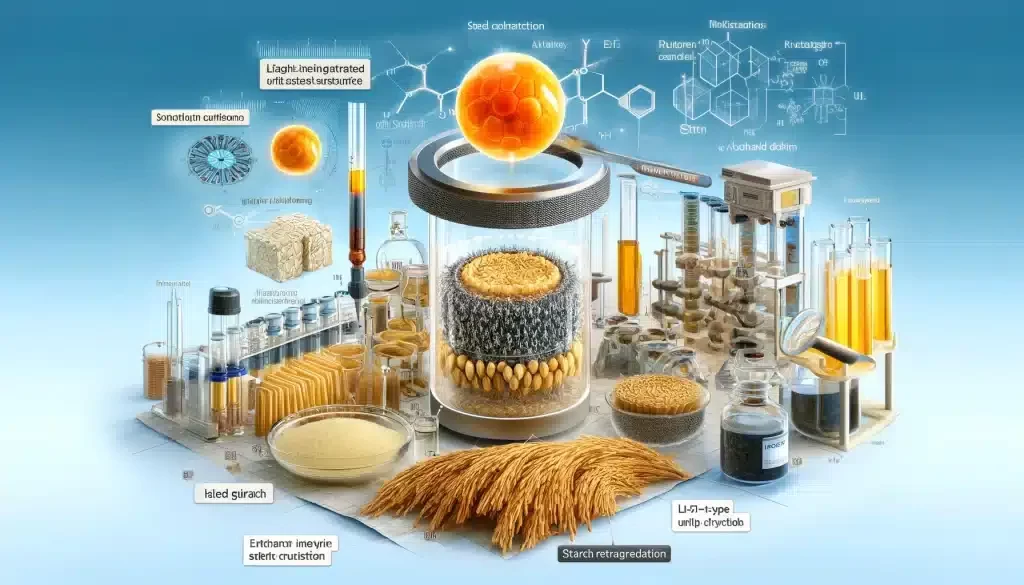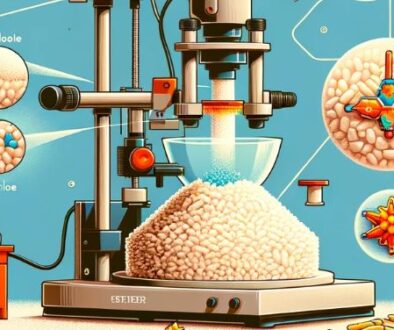Effect Of V-Type Seed Crystal On The Retrogradation Characteristics Of Rice Starch
Exploring lipid-integrated V-type seed crystals in rice starch, enhancing nutritional starch properties through structural transformation and retrogradation process insights.
Abstract: V-type seed crystals were constructed by introducing lipids into the starch system, and were added to the rice starch retrogradation system. X-ray diffractometer and differential scanning calorimeter were used to characterize the seed crystal characteristics and their influence on starch retrogradation. , to realize the analysis of the common mechanism of lipid anti-retrogression from the perspective of crystal structure transformation. The research results show that the orthorhombic unit cell of the V-type seed crystal has the characteristic that the c axis is significantly longer than the a and b crystal axes. Under storage conditions of 4¡ãC, some crystal seeds act as crystal nuclei in the starch system to accelerate starch retrogradation, significantly increasing the starch recrystallization rate; the molecular chain segments on the growth surface of the seed crystal will affect the starch molecular chain segments approaching it. Arrangement, thereby making the molecular chains of the induced starch unit cells more closely arranged, more like a V-type crystal seed unit cell, and the crystals grow faster and the formed grains are larger. The revelation of these crystal change patterns provides a new explanation for the resistance to enzymatic degradation of starch-lipid complexes, and provides an important theoretical basis for the application of lipids in the creation of slow-digestible nutritional functional starches.
Introduction to Innovative Starch Modification
In recent studies, a groundbreaking approach to enhancing the properties of rice starch has been unveiled through the introduction of V-type seed crystals, constructed by incorporating lipids into the starch system. This innovative methodology has significant implications for the food science sector, particularly in the development of slow-digestible nutritional functional starches. This article aims to provide a comprehensive overview of this research, detailing the methodology, results, and potential applications in the industry.
Methodology: Integrating Lipids into Starch Systems
The research focused on adding lipid-integrated V-type seed crystals to the rice starch retrogradation system. Retrogradation, a process crucial to understanding starch’s behavior, especially in food storage and processing, involves the recrystallization of starch molecules after they have been gelatinized and cooled. This phenomenon affects the textural quality, shelf life, and digestibility of starch-based foods. The introduction of V-type seed crystals serves to modulate this process, with a particular focus on the interaction between lipids and starch molecules during retrogradation.
Analytical Techniques and Structural Insights
The characterization of the seed crystals and their impact on starch retrogradation was meticulously analyzed using advanced techniques, including X-ray diffractometry and differential scanning calorimetry. These techniques facilitated a deeper understanding of the crystal structure transformation and its correlation with lipid-mediated anti-retrogression mechanisms in starches.
Impact of V-Type Seed Crystals on Starch Retrogradation
One of the pivotal findings of the study is the distinct orthorhombic unit cell structure of the V-type seed crystal, characterized by a significantly elongated c-axis compared to the a and b crystal axes. This structural peculiarity plays a critical role in the crystal’s ability to influence starch retrogradation. Under storage conditions of 4°C, the V-type seed crystals act as nuclei within the starch system, accelerating the recrystallization rate of starch. This acceleration is attributed to the molecular chain segments on the growth surface of the seed crystal, which influence the arrangement of approaching starch molecular chain segments. Consequently, the induced starch unit cells exhibit a tighter arrangement, resembling the V-type seed crystal unit cells, leading to faster crystal growth and larger grain formation.
Mechanistic Insights into Starch-Lipid Interactions
These findings reveal the intricate patterns of crystal change, offering a novel explanation for the resistance of starch-lipid complexes to enzymatic degradation. The introduction of lipids not only alters the crystal structure but also enhances the starch’s resistance to rapid digestion, paving the way for the development of functional food products aimed at promoting health and well-being.
Implications for Nutritional Functional Starch Development
The implications of this research extend far beyond the academic sphere, providing a valuable theoretical foundation for the application of lipids in creating slow-digestible nutritional functional starches. By leveraging the unique properties of V-type seed crystals, food scientists and manufacturers can develop starch-based products with improved nutritional profiles, longer shelf lives, and enhanced textural qualities. This study represents a significant step forward in the quest for healthier, more sustainable food options, highlighting the pivotal role of innovation in food science and technology.
For futher details of this article and research, feel free to contact our team for assistance.
Original research was done by Xu Rui, Tian Yaoqi, Hu Bing, Qiu Lizhong
About ETprotein:
ETprotein, a reputable plant protein vegan protein Chinese factory manufacturer and supplier, is renowned for producing, stocking, exporting, and delivering the highest quality organic bulk vegan protein and plant proteins. They include Organic rice protein, clear rice protein, pea protein, clear pea protein, oat protein, watermelon seed protein, pumpkin seed protein, sunflower seed protein, mung bean protein, peanut protein, various of plant peptides etc. Their offerings, characterized by a neutral taste, non-GMO, allergen-free attributes, cater to a diverse range of industries. They serve nutraceutical, pharmaceutical, cosmeceutical, veterinary, as well as food and beverage finished product distributors, traders, and manufacturers across Europe, USA, Canada, Australia, Thailand, Japan, Korea, Brazil, and Chile, among others.
ETprotein specialization includes exporting and delivering tailor-made protein powder and finished nutritional supplements. Their extensive product range covers sectors like Food and Beverage, Sports Nutrition, Weight Management, Dietary Supplements, Health and Wellness Products, and Infant Formula, ensuring comprehensive solutions to meet all your protein needs.
As a trusted company by leading global food and beverage brands and Fortune 500 companies, ETprotein reinforces China’s reputation in the global arena. For more information or to get a free sample of their protein products, please contact them and email sales(at)ETprotein.com today.












